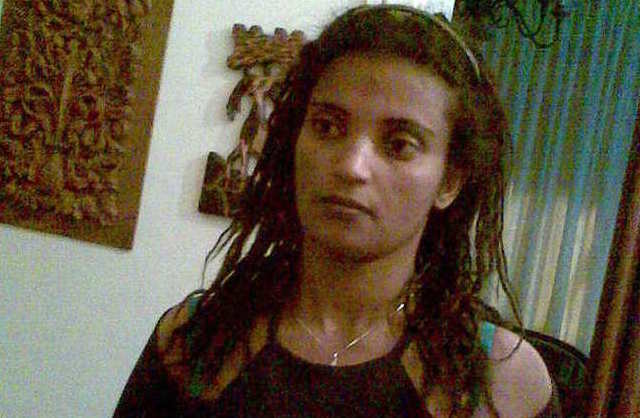 Tadias recently interviewed Rahel Zegeye, who works and lives in Lebanon, about her new film called "Beirut" - which deals with the conditions of Ethiopian women working there. (Courtesy photo) " Tadias Magazine
Tadias recently interviewed Rahel Zegeye, who works and lives in Lebanon, about her new film called "Beirut" - which deals with the conditions of Ethiopian women working there. (Courtesy photo) " Tadias MagazineBy Tadias Staff
Tuesday, September 13, 2011
New York (TADIAS) – Widespread news coverage of an Ethiopian migrant worker in Libya, Shweyga Mullah, who had cared for two of Moammar Gadhafi’s grandchildren and suffered abuse and severe burns, has elicited heated reactions from Ethiopians worldwide. Her story brings to the forefront the plight of thousands of female Ethiopian migrant workers who continue to work under dangerous conditions in various countries in the Middle East.
“My heart is burning,” said Rahel Zegeye, who left Ethiopia when she was 20 years old to work as a maid in Lebanon. She still works and resides there. “The Ethiopian government should press charges against the madam (Aline Skaf-Hannibal). I would like to see equal treatment of the case no matter who committed the crime.”
Rahel is also the Director of a new film called Beirut, which documents Ethiopian domestic workers in Lebanon.
We recently interviewed Rahel Zegeye about her movie and the living conditions of Ethiopian women in the Arab world.
TADIAS: Thank you Rahel for your time. Please tell us a bit about yourself. Where you were born, grew up, and when did you move to Lebanon and why?
Rahel Zegeye: I was born in Addis Ababa as the middle child of nine siblings. At school I took acting and film classes. When I was 20 years old I left Addis for Lebanon in order to work as a maid to earn money and help support my family back home. My father was a soldier and retired early. Since I was very young my dad has always been unemployed which was the main reason why I left to work.

TADIAS: Please tell us a bit about the film Beirut. What is it about?
RZ: Beirut is a drama about a group of Ethiopian girls in Lebanon working as domestic workers.
TADIAS: What inspired you to make the movie?
RZ: I want to shed light on the inner lives and thoughts of a domestic worker, an aspect which is usually hidden from the Lebanese and foreign public.
TADIAS: Are the characters fictional or are they based on people you know?
RZ: The characters are fictional but they are all based on the Ethiopian girls that I have encountered during my ten years working in the country.
TADIAS: Can you give us a brief description of the plot?
RZ: The story centers on Hiwot, Z, Zufan, Misir, Saba and Hana who are friends but lead very different lives. Hiwot, left her employer’s house a long time ago and started a life earning a living as a prostitute. She parties, smokes and drinks and seems very happy and free. The story starts when she wants to find a co-worker, another girl who could satisfy her clients (mainly Sudanese workers). Saba, still a housemaid, complains about her ‘madam’ and wishes to run away. One day she takes the courage and joins Hiwot in her free life, much against the objections of her two good friends Misir and Hana. Misir and Hana, both working as maids, represent the ‘good girls’ in the story. Although Hana is being mistreated by her madam she does not want to run away and join the ‘naughty girls’ but just wishes to return home to her country. The lives of the girls get intertwined once Saba, encouraged by Hiwot, goes and lives with an Ethiopian man named Yared. Yared is in fact married to Zufan, but is not a man to be trusted.
TADIAS: Your film also highlights prostitution prevalence among Ethiopian women in Lebanon.
RZ: Yes it does. Many girls who run away from their employers house resort to prostitution as a way to earn a living, especially if they cannot find work elsewhere.
TADIAS: What are the biggest problems that Ethiopian domestic-workers face with their employers?
RZ: There are many. Most common issues include bad treatment, abuse from employers, no rest and no day off. It is also very common that the maids are not paid on time or at all, and that the employers limit their food or let them stay without food. Many employers are very racist and do not treat their workers with respect, dignity or humanity. Sexual harassment and abuse by employers also occurs. For example I know three girls who were made pregnant by their mister and were threatened not to tell their madam, and had to leave the house to go to the hospital to make an abortion.
TADIAS: How true are some of the horror stories we hear and read about in the media? And what can women do to protect themselves from such violence?
RZ: The horror stories are real and they occur, there are many more horror stories that are not reported and written about. There is very little protection for the women coming to work in Lebanon. She can try to communicate with her employer but many times there will be language problems and if the employer is abusive then there is little chance they will listen to her. She can ask them to let her go to the embassy and to return home. If she returns to the agency that brought her here they will not help her, just change employers, which may be for the better or for the worse. If she runs away from her employers she will not have her passport and papers and cannot go back to Ethiopia.
TADIAS: What are their rights as domestic laborers? Can they report abuse without fear of retaliation by wealthy and powerful employers?
RZ: Migrant domestic workers have no rights and protection within the Lebanese labor law. They can report abuse to police but police tend not to look into these cases. Today when I took the taxi, the taxi driver physically harassed me and I refused to pay him. Although there was a police nearby that witness the incident he saw that the driver was Lebanese and I’m Ethiopian so he also said I had to pay the taxi driver. Racism like this occurs all the time. Another example is when my previous madam took 4,000 USD from my bag (money belonging to the Ethiopian girls at church which I was keeping safe for them). My madam claimed this was her money and I was devastated for one week not knowing what to do. I even thought about suicide. If I go to police he will beat me, keep me there and then when my employer comes the police will believe her and not me. In the end it was my madam’s son who came and told his mother to give back the money that didn’t belong to her. It’s these injustices that we endure and are powerless to do anything about that drives many domestic workers to choose suicide as the only way out.
TADIAS: What are your feelings about the case of Shweyga Mullah, the Ethiopian Nanny in Libya?
RZ: My heart is burning. The Ethiopian government should press charges against the madam. I would like to see equal treatment of the case no matter who committed the crime. The madam should not get a lighter sentence because she is a madam and not a maid.
TADIAS: We understand that you are having problems distributing your film. Can you tell us more about that?
RZ: As I worked on the project independently I didn’t have any support with the distribution when I finished the film in 2006. On top of that there was the July 2006 war in Lebanon and I had many problems with my employer which led to me leaving her. For four years I did not have any papers and could not return to Ethiopia. Now with the support of my employer and friends in Lebanon we have managed to get more interest in my project and I hope we can show the film to a broader audience.
TADIAS: How can interested distributors get in touch with you?
RZ: Send any email to me at barchzegeye@yahoo.com.
TADIAS: What is your advise to young girls in Ethiopia who may be thinking about taking a job as maids in the Middle-East?
RZ: First of all I would advise them not to come and work at all, it’s a very difficult life. Many regret the choice of coming to work and are crying every day. The stories that tempt them to come here are mainly untrue, it’s not a fast track to become rich. You don’t learn anything good from only overseeing the house and cleaning and you will not develop as a person. Also you must cope with isolation and face discrimination. For those that quit school in order to work, it’s better to finish your education back in Ethiopia and find a job, things are improving also in Ethiopia. If they still want to come then I would advise them to get all the information they possibly can from the embassy and agency and contacting their friends and family who are working abroad.
TADIAS: Is there anything else you would like to share with our audience?
RZ: I am now focusing my energy on my new ideas for a short film and welcome any advice, suggestions and support from the readers.
TADIAS: Thank you again, Rahel, and good luck!
—
Tadias thanks Janie Shen for assisting with the interview.
Related Stories:
How Gadhafi’s Daughter-in-Law Burnt Ethiopian Nanny With Scalding Water
Click Here to Donate to Shweyga Mullah’s Fund
No comments:
Post a Comment